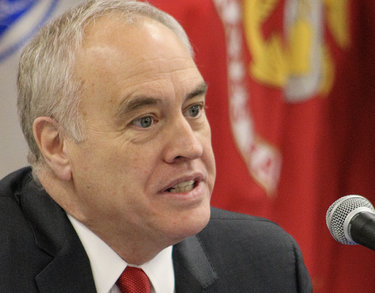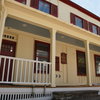Berne may be able to enact 19-percent tax increase without board, but with stipulations
BERNE — Despite lacking a town board, Berne Supervisor Dennis Palow appears to have the authority to unilaterally enact the 2025 budget — the draft of which so far would increase the tax levy 19 percent — but because there won’t be a vote to override the state’s 2-percent tax cap, there will be stipulations on the use of the funds.
Press Secretary for the State Comptroller’s Office Mark Johnson told The Enterprise this week that state law says when a government collects money beyond what’s allowed by the tax cap without first overriding it, it’s required to put the extra money in a reserve “and use that excess amount and any interest earned to offset the tax levy for the following fiscal year.”
The law itself adds that the comptroller may place additional requirements on spending.
This adds a new dimension to various media reports this week that relied on Association of Towns Executive Director Chris Koetzle’s take that the town can enact its budget, which Palow reiterated in a televised Channel 10 interview.
Koetzle told The Enterprise that he was unaware at the time that the town was seeking to raise its taxes well beyond the cap, and, after convening with his team to do more research, came back saying the same thing as Johnson.
“Hopefully they don’t get mad at us and say we don’t know what we’re talking about,” Koetzle said of the comptroller’s office before reiterating how unusual the situation is.
“There’s nowhere that this is written or that we can point to, whether law or even an opinion out there that we know of yet,” Koetzle said.
The section of state Municipal Law cited by Johnson technically restricts itself to cases where there’s been “clerical or technical errors” that resulted in an excess levy.
Ultimately, Koetzle said, the Association of Towns came to its conclusion by fusing together what would happen in different situations that normally wouldn’t co-occur, namely that a budget and tax-cap override both go without a vote.
Koetzle said the association knows with certainty that, when a board is unable to adopt a final budget, the town falls back on its draft and, if a board authorizes a draft that’s in excess of the cap but never authorizes the override, the comptroller “captures” the extra money.
“This is kind of convoluted but we’re taking two different pieces of things that have happened and putting them together and saying, ‘Well, this is logical,” Koetzle said.
State oversight
That the Association of Towns and the Office of the State Comptroller’s Office unbeknownst to each other came to the same conclusion — and that it was the Association of Towns that Palow was using as his basis for action, despite the uncertainty surrounding everything — highlights the negligible role the state has played so far in helping Berne through its crisis of government.
Johnson had initially been noncommittal with The Enterprise about how the town would go about handling the budget, despite the fact that state law was unclear and appeared not to foresee the potential for a town board to lose its majority.
“Questions about how these provisions will inform the town of Berne’s budget process this year should be addressed to town officials and the town attorney, who are in the best position to comment on the specific developments there,” Johnson said earlier this week.
It wasn’t until The Enterprise pushed back that he returned with more specific information.
Governor Kathy Hochul’s office has been even more restrictive in its communications, including, allegedly, with town officials, as Palow claimed in an interview this week with the Times Union.
The Enterprise is awaiting a response to a Freedom of Information Law request for correspondence between state and town officials to verify his claim.
Hochul is empowered to appoint at least one member to the town board to make it functional again, but so far hasn’t, even though the three board members who resigned did so in mid-August.
She had, earlier this year, made appointments to the town board of Hermon, New York, roughly a month after officials there had submitted their resignations.
“This could have been avoided,” Koetzle told The Enterprise this week. “The governor does have appointing authority and could have appointed a functioning town board, but that didn’t happen.”


